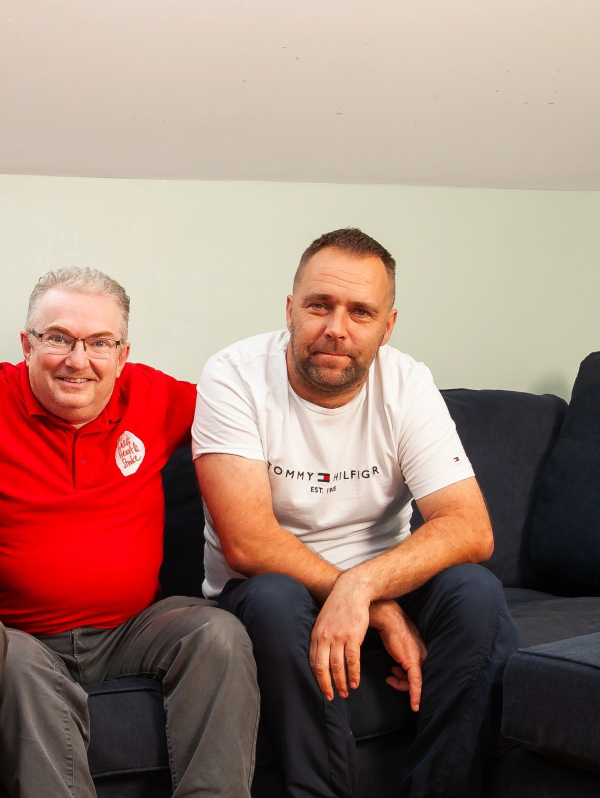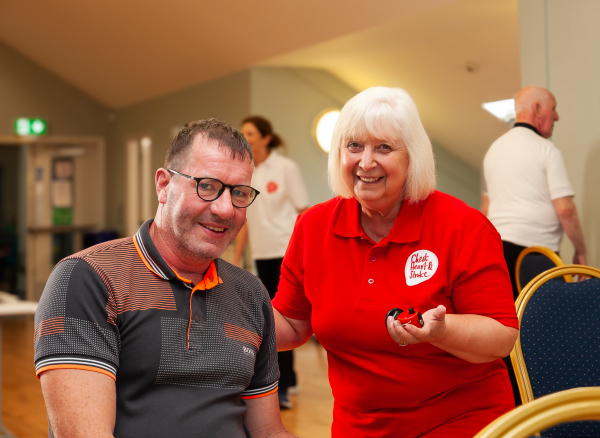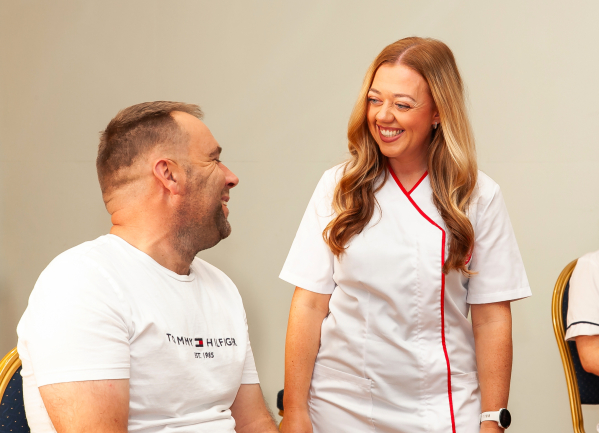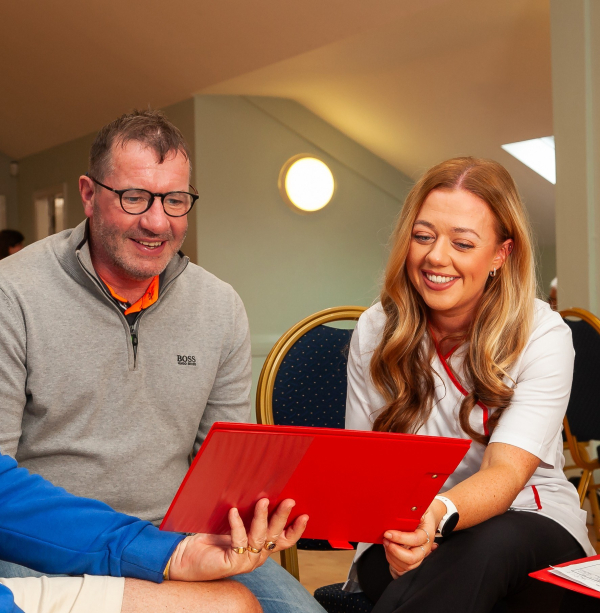International Men’s Day (Wednesday 19th November) raises awareness of men’s wellbeing, and Lee Finlay and Kieran Loughran know all too well what it is like when your health is affected unexpectedly. Both men had life-changing strokes during the summer and are using International Men’s Day to share their stories. They hope speaking out will help inspire other stroke survivors to keep fighting on their recovery journeys. They also want to raise awareness that a stroke can happen to anyone, at any time, no matter their age.

Lee, 42, recalls; “I was just 41 when I had my stroke in June. It was the last thing I ever imagined happening.”
“I woke up one morning with an awful pain behind my left eye. I didn’t feel right, but I just put it down to tiredness. I went to work but the pain came and went through the morning, and when it came, I could hardly focus, I had never felt anything like it. After a while I had to go home.”
“When I got home, I went up to bed and told my wife I was just tired. Then my bottom lip started to feel numb, and my speech was slurred. My wife said I needed to go to hospital and at that point I agreed.”
“In triage at Craigavon Area Hospital A&E I was checked over and was told, in the worst-case scenario they would treat me as if I had had a stroke, but I was still thinking it was tiredness. Then the nurse said he was going to ring a bell, and it was nothing to worry about. In no time there were about five other nurses and doctors around the bed and that’s when I thought it must be something more serious.”
An MRI scan confirmed a stroke which was a terrifying thought for Lee. “I was starting to process things and was thinking about my grandmother who had a stroke. She couldn't walk or talk, and my mum looked after her for over 15 years. There was a lot going through my head. I was thinking about my wife and children. You think about all sorts and it's hard not to.”
“I could talk ok, and I could walk although it was hard, and I was unsteady. My arm had also been severely affected. My main thought was, ‘what can I do now to get better?’ I was told the best course of action was exercise and rest so every couple hours I got up and walked from one side of the bed to the other. I would also go for walks along the corridor. I was exhausted afterwards and would literally fall back into bed. I had a half bottle of water and was squeezing that when I was in bed to work on my grip.”
“From the outset my focus was on getting better. I wanted to know everything I could do, and I worked hard on it. I was only 41, I have a family, I work hard, I had to recover as best I could to get back to my life. I knew I would just have to keep on trying with things, even if they were hard. I was going to do whatever I needed to.”
When Lee was discharged from hospital his recovery journey continued as he explains; “When I got home the physio and occupational therapists worked with me to try and heal by right-sided weakness. When I first came home, I wouldn’t have been able to open a bottle of water with my right hand. I just kept doing my exercises and working on my recovery but the tiredness, even now, was just unreal. It is true fatigue. If I push myself too much, I am exhausted and that then impacts the days which follow.”
“I also find it hard to remember things and I can get lost if I am in a group of people chatting. I can lose the thread of conversation but if that happens, I just take myself out of it for a while.”
“There has also been a significant mental impact. I was very young to have had a stroke and that was hard to get my head around. When I was in hospital there were people twice my age in the same ward and I thought, ‘what am I doing here?’ But it’s not just elderly people who have strokes. That’s why I would urge people, if you spot any sign of stroke, get to hospital as soon as possible and don’t ignore things.”

Kieran, 58, would agree with that, having also had a stroke in the summer. Kieran explains; “It was a Sunday morning. I had eaten breakfast, did some housework and was getting ready to go out when I had to sit down because I just felt something not right was happening.”
“It all happened very quickly. I felt it first in my hand, like pins and needles, then in my arm and I lost my speech. My face dropped a bit on the left side too. My partner, Geraldine, phoned 999 and a paramedic came out in a car, but I had to wait around an hour and a half on an ambulance. That was stressful because I knew there was a time limit to get the clot busting thrombolysis injection.”
“When I arrived at Craigavon Area Hospital, I had an MRI scan within ten minutes and was able to have thrombolysis just within the time limit. That’s why I would urge people to seek help as soon as possible if they notice any symptom of stroke. Time is of the essence.”
Like Lee, Kieran was treated in hospital for a few days before being discharged to continue his recovery at home. “I’ve been working hard on my recovery since June. It’s all about retraining your brain to do things you can't anymore, things you would have taken for granted.”
“When I came out of hospital, I thought I hadn’t been affected too badly until the physio came out to see me. She did the stair test, and you are scored out of 27-my first score was around 7. She gave me exercises to work on the weakness in my left side and I really concentrated on those and pushed myself on to do them, increasing them as time went on. I started to see improvements within two weeks, and I kept going.”
“I’m still not quite back to where I was, it takes me longer to go down steps and with my fine motor skills I find coordinating movements difficult, but I am just continuing to work on these things and trying to improve.”
“It can also take me a while longer to process things, and the fatigue is a big side effect. Pre stroke I was very active, I worked seven days. Now there are some days I can do little. It’s also mentally hard to get your head around when you are the sort of person that is used to always being on the go, to suddenly be in a situation where that has completely changed overnight.”

Somewhere both men have found support and help however is at Northern Ireland Chest Heart & Stroke. They attend the charity’s Armagh Post Rehab Exercise Programme (PREP) which is a physiotherapy led, community-based course to help rebuild people's lives after stroke through exercise and education. It is designed for stroke survivors who have completed the statutory rehabilitation provided by the NHS to meet their longer-term care needs.
Lee says; “I was a bit nervous going to PREP for the first time. I wanted to go because I knew there were people there in the same scenario as me. I wanted to go to hear their stories, how they had been affected, what had helped them on their recovery journeys, and it has been a big support. The physio exercises really helped too, and the information sessions afterwards have made me think about some lifestyle changes I can make towards being healthier which is good.”

Kieran agrees about the positive impact PREP has on recovery; “I find PREP really useful. I completed six weeks initially and then signed up to do another six weeks. The team really know what they are talking about and can truly help make a difference to your recovery. Like many things in life, you don’t realise the help that is out there until you need it.”
Ursula Ferguson, Director of Care Services at Northern Ireland Chest Heart & Stroke explains, “We are very grateful to Lee and Kieran for sharing their stories in support of our charity and International Men’s Day. Having a stroke is a life-changing reality for thousands of people in our local community every year and people may be surprised to learn that 50% of stroke survivors in Northern Ireland are under 75.”
“We have just recently finished running a stroke awareness campaign due to the fact there has been a 23% increase here in the number of people registered with their GP as having had a stroke or Transient Ischemic Attack (TIA)¹, over the past ten years. It is therefore imperative we continue to raise awareness of stroke symptoms and remind the public to act FAST if they spot any symptom of stroke:
F - Face – is it drooping on one side?
A - Arms – is their arm weakness? Can they be raised?
S - Speech - is it slurred?
T - Time to get to hospital as soon as possible.
“As well as the negative impact on physical wellbeing, stroke can reduce independence, confidence, and happiness. Stroke can also affect relationships, take away jobs and careers and render some families isolated within their own homes- but NICHS is here to help with expert care and support.”
“The help available from our Care Services team is extensive and, alongside PREP, includes family support, health education programmes, our Wellness Sessions, Young Stroke groups and caregivers support.”
“Our team works across Northern Ireland with people of all ages affected by stroke, alongside their families and carers. They are dedicated to supporting people in adjusting to life with a stroke condition, helping them to enjoy life to the full, re-engage with hobbies, and improve their confidence, independence, and overall quality of life.”
If you have been affected by stroke visit https://nichs.org.uk/strokesupport for further information about NICHS’s stroke support services.
